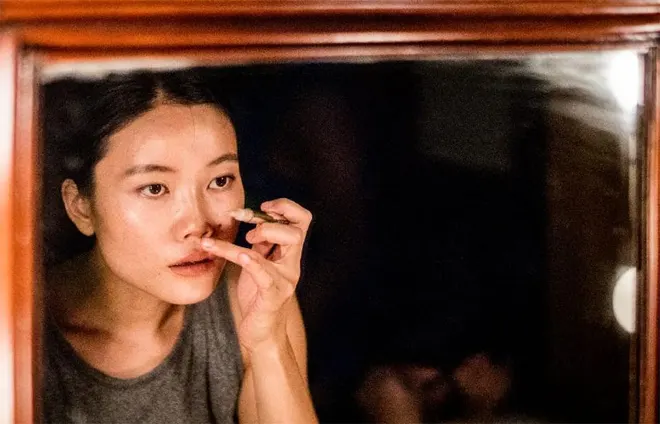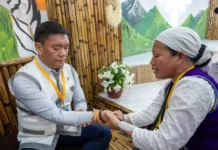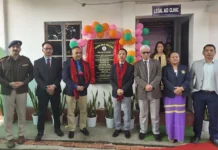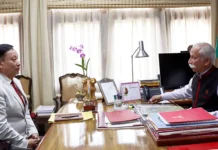[Karyir Riba]
ROING, 31 Aug: Aseng Borang, a dance practitioner, choreographer and dance writer from Roing, Lower Dibang Valley district, has been selected for an artist residency at Delfina Foundation, London, United Kingdom.
The scheduled time period of the residency is from 25 September to 17 December.
In February 2023, Delfina Foundation created an open call specifically for Northeast-based artists from India for a residency in London. Delfina Foundation is an incubator for artists, curators and thinkers to experiment with ideas, pursue research, explore connections, and build collaborations with colleagues, communities and institutions.
As part of the residency, it facilitates connections with artists, organisations and art professionals in order to establish a mutual exchange of ideas and to forge new opportunities for artists.
With support from Charles Wallace India Trust, Emami Art, and Inlaks Shivdasani Foundation, Delfina Foundation will also provide Borang a scholarship of up to Rs 6 lakhs, along with many other facilities.
Located in central London, Delfina Foundation is an ideal base for conducting research, developing ideas and making connections.
Borang has a master’s degree in performance practice (dance) from Ambedkar University, Delhi, and has a number of artistic works under her belt. She holds a bachelor’s degree in political science from Delhi University, and has also completed a certificate course in art appreciation from the National Museum Institute.
As an artist, her practice involves objects, landscape, performative text, yoga, Shaolin Kungfu, pole dance and contemporary movement techniques. Her embodied movement practice is informed by the continuing existence of the politics around her racialised female body.
As a choreographer, her works investigate the physical and the subjective body within the constellation of resistance, vulnerability, legal, violence and anarchy. The creation of codified spaces in which the objective bodies perform, view and experience the space as another set of reality is a choreographic pursuit in her practice.
Her recent work, ‘Terms and Conditions Apply’, attempts to blur the meanings between play and performance via an interactive game/work in which each body enters and exists in the space only as participants and not as performers or spectators. The work was first presented in the Tanzplan Dance Education Biennale, Kampnagel-2020 in Hamburg, Germany. The work was also showcased in Serendipity Arts Festival, Goa, in 2022.
Later, the work was reimagined in the city of Kolkata during January-February 2023, with the support of the Pickle Factory Dance Foundation.
Borang will be performing the same work in Camping Taipei, Taiwan, in November this year.
In November 2021, she founded Studio Yingko in her hometown, with an endeavour to include the local communities in movement-making and dance-making processes.
Borang won the Prakriti Excellence Contemporary Dance Award, 2018, from the Prakriti Foundation for her work-in-progress, ‘Erosion of Tangko’.
She was awarded an excellence award for dance, and her contributions to the Choreography Society of Kamala Nehru College in 2014, and had also won the All India silver medal for New Media in the Kalanand Contest, 2019, by the Prafulla Dahanukar Art Foundation.
In 2019, she participated in Camping, Paris, France through the Institute Francais India, and received the residency travel grant (performing arts – choreography, 2019-’20) from the Serendipity Arts Foundation.
At the moment, she is interested in critically questioning and looking at the legal bindings and stamps that her contemporary tribal body carries.
“What do the ideas around inheritance, pure tribal culture, and heritage propagate? Can we question the logic and absurdity of all of it – in its certification, permits and customary laws?
“In 2021, a very progressive Arunachal Pradesh State Commission for Women proposed a historical bill regarding legalising property rights for women and abolishing polygamy among men in Arunachal Pradesh. As tribal citizens, our communities for centuries have worshipped nature: the earth, the sky, the wind, the sun and the moon. We have always had an innate relationship with our natural resources, especially in how we utilise them.
“To be a tribal means to have a social and a spiritual relationship with the earth and to be in a tribe means to share and respect those values. But are these values applicable only for a specific gender? Whom do they actually benefit and at the sake of whose freedom and autonomy? These are the questions and concepts I plan to entangle during my residency in London, United Kingdom,” she said.





